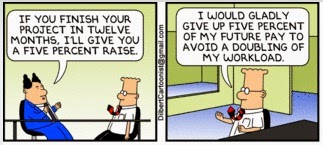Overpaid Bosses? It’s Rational!
Why are higher
ups so grossly overpaid? Pretty much everyone agrees that they are (even the
higher ups feel the even more higher ups are overpaid!); but why are things
that way? Tim Harford analyzed just that question in his book, The Logic of Life. His answer is both
interesting and depressing.
The higher up
you go, luck plays an increasingly important role in the outcome of your work.
The General Manager may allocate funds for a new product: whether or not it
succeeds is a function of so many uncontrollable variables. Like a recession.
Or the best brains quitting halfway into the project. Or a new game changer
launched by a competitor. You get the idea.
As luck’s role
increases, the career risk for the guy higher up increases. When Microsoft’s
tablets bombed, the engineers who worked on it will easily get other jobs. But
the CEO (is rumoured to have) lost his job (it cost $900 million). The CEO’s
job may be an extreme example, but the principle applies for middle and upper
managers too. They become the visible face of failure. And with that kind of
publicity, how easily can the guy get another job? So, Harford argues, their
high pay is partly to compensate for the risk that comes up with the job.
The other reason
is that a Vice-President who already makes a million isn’t going to be
motivated by a 20% hike at the next role, would he? The only way to motivate a
guy who already makes a lot is to dangle (even more) obscene amounts at the
next rung! Hell, even Dilbert, the “lowly” engineer feels that way:
And lastly,
Harford says that if you’re in a designation where luck has a role to play
(medium to large), would you work your butt off to get to that next level? Or
would you say “I might not rise despite my hard work because luck has such a
big role, so why bother?” Well, to make you slog in such an environment, the
incentive has to be very, very high. Like an exorbitant pay hike.
Well, that’s
Harford’s theory anyway. And right or not, it is definitely logically
consistent. Which leads to the depressing conclusion:
“A rational world isn’t necessarily a
perfect world, and nowhere is that more true than in the office.”

Comments
Post a Comment